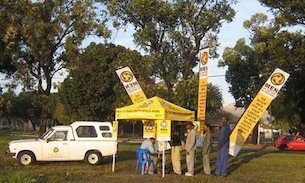MSR seeks to bridge the gap between the growing economy and unemployed people with low skills by increasing people's ability to earn a sustainable income.
CASE STUDY: Men on the Side of the Road (MSR)
Organizational Vision
Each day an estimated 18,000 men aged 15-60 gather at roughly 180 municipal job sites throughout South Africa. Always at the same major intersections come rain or shine, these are the men on the side of the road, waiting expectantly for contractors, homeowners anyone who cares to offer them a day's casual labor.
Launched in 1999 in Cape Town, the Men on the Side of the Road (MSR) Project aims to build unity amongst this group of individuals.
The overall vision of the project was to empower the unemployed men who gather at municipal job sites to be better able to compete in the labour market through a comprehensive programme of self-development, life skills training, technical skills training and placement, which in turn gives them the skills and confidence to actively seek long term job opportunities.

Citizen Base Strategy
MSR was created when Ashoka Fellow Charles Maisel devised a way to employ the 18,000 males who gather at roughly 180 sites throughout South Africa waiting for a day’s labor. Through a national marketing campaign, MSR initiated a massive tool drive for old, unused, and even broken tools, which can then be repaired and used by the day laborers. Instead of having to go to anonymous drop-off points to donate, citizens are asked to call MSR, who then sends out these day laborers to pick-up these tools directly from the community, thereby building a human connection.
MSR at WorkOnce renovated, these tools are then lent out or sold at discounted rates to the unemployed who pay membership fees to participate in the program. 30,000 tools to date worth R300,000 ($50,000) have been collected. They are stored in the Tools Shack, a second-hand retail shop, run by volunteers, which sells the refurbished tools. A sliding price scale allows them to retail in the poorer townships. MSR’s Tool Shack has directly sold $20,000 worth of tools.
The project partners with corporations to provide skills’ training that focuses on providing information on certain trades, job placement, and self-employment. Certified by well-known hardware stores, these workers gain a competitive edge when waiting for labor, since customers can trust their skills’ quality.
This innovative solution has solved more than just unemployment. Equipped with both the physical and mental tools of labor, these workers have come together in Federations in order to increase their own success rate. Alongside MSR, they have built shelters, spread worker rights’ education, and established partnerships with government agencies, unions and human rights organizations to improve their standard of living.

Lessons Learned
Make use of untapped resources. Look for both people and assets in the community that are not being used to their potential. Employing and co-design solutions with those you are helping empowers them to make change.
Prove your social commitment before asking for money. In this case, by asking for tools before donations, MSR built human relationship and trust in the community, which resulted in a greater supply of financial donations later on.
Think outside of the box. Brainstorm at every level of your organization; draw on entrepreneurial friends for ideas; learn about organizations in different fields on different continents. Courageously come up with new strategies; and if your strategy doesn’t work, don’t be afraid to redesign it.
Charles Maisel was elected to the Ashoka Fellowship in 2000.
